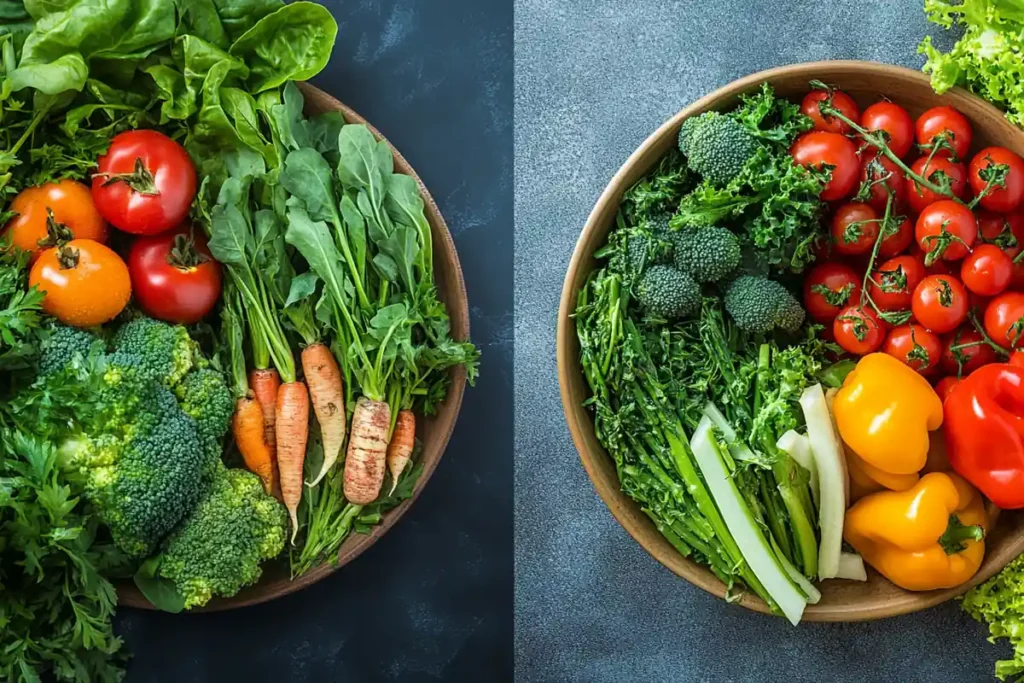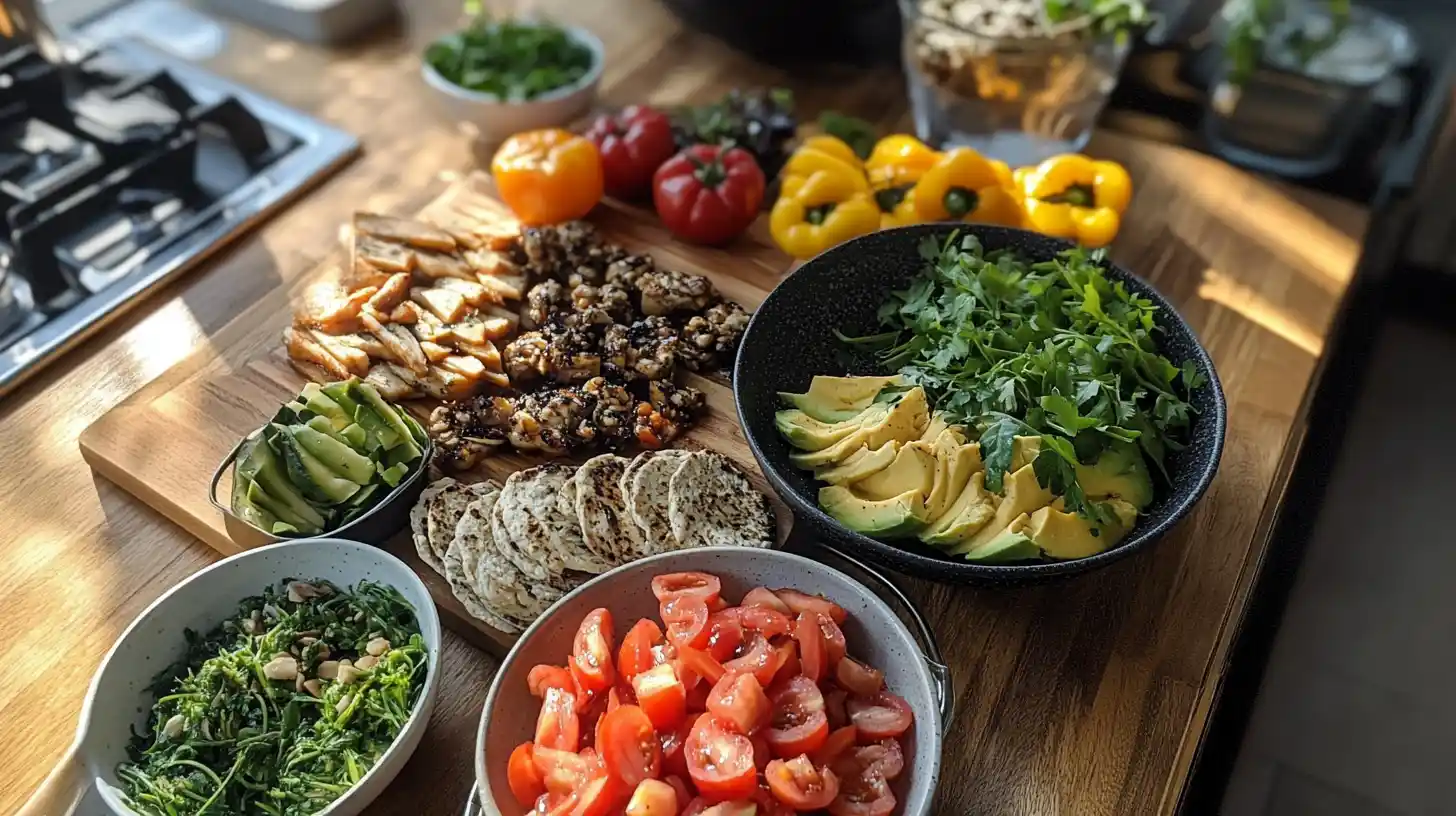Discover if a raw vegan diet is anti-inflammatory, supports overall health, and helps you thrive through raw vegan inflammation reduction.
Understanding Is raw vegan diet anti inflammatory?
Many people wonder: Is raw vegan diet anti inflammatory? Indeed, this question arises often as more individuals seek natural ways to improve health. Basically, a raw vegan approach emphasizes fresh fruits, vegetables, nuts, and seeds. Consequently, it avoids processed foods, animal products, and high-heat cooking. Undoubtedly, inflammation underlies many chronic conditions. Therefore, focusing on an eating plan that helps reduce it seems wise.
Defining Is raw vegan diet anti inflammatory? and Key Concepts
Initially, understanding what inflammation means is essential. How to Go Raw Vegan for Beginners explains foundational steps to adopting this lifestyle, which may help reduce inflammation. Is raw vegan diet anti inflammatory? involves looking at how certain foods trigger or calm the body’s immune response. Inflammation occurs when your body’s defense system fights against harmful agents. However, chronic inflammation can damage tissues over time. Eventually, this leads to health problems. Comparatively, a raw vegan diet prioritizes whole, plant-based foods. These often contain nutrients that can calm the inflammatory process. Conversely, highly processed meals may fan the flames of inflammation.
Inflammation Basics: What It Means for Your Body
Generally, inflammation appears as redness, swelling, or heat. However, inside the body, it can be silent. Consequently, it may show up as joint pain, digestive issues, or fatigue. Meanwhile, research suggests certain dietary patterns can reduce these symptoms. Another way to view it is through cellular health. Specifically, antioxidants in raw plant foods combat harmful free radicals. Thus, they may support a balanced immune system. Eventually, small dietary shifts can add up to big improvements.
Common Triggers of Inflammation in Standard Diets
Furthermore, standard diets often include processed sugars, refined grains, and trans fats. Comparatively, these foods can increase oxidative stress and inflammatory markers. Conversely, raw vegan diets rely on fiber-rich, antioxidant-heavy foods. Consequently, the body experiences less irritation. Moreover, studies suggest that reducing processed foods leads to better health outcomes. Finally, steering clear of animal products can also lessen exposure to inflammatory compounds found in high-heat cooked meats.
Nutrient Profile of a Raw Vegan Diet and Is raw vegan diet anti inflammatory?
Adopting a raw vegan approach means tapping into a wide array of nutrients. Is raw vegan diet anti inflammatory? becomes clearer when examining these nutrients closely. Accordingly, natural foods provide essential vitamins, minerals, and bioactive compounds. Eventually, these components work together to support overall well-being. Undoubtedly, a diverse raw vegan plate brings anti-inflammatory potential to the forefront.
Antioxidants, Phytochemicals, and Is raw vegan diet anti inflammatory?
Chiefly, antioxidants and phytochemicals found in raw fruits and vegetables play a key role. Indeed, berries, leafy greens, and sprouts abound with these compounds. Consequently, they reduce oxidative stress that triggers inflammation. Another example is curcumin in turmeric, a potent anti-inflammatory phytochemical. Similarly, polyphenols in berries help neutralize free radicals. Eventually, loading up on these foods can improve health in the long run.
Essential Micronutrients in Raw Plant Foods
Equally, raw vegan foods deliver essential micronutrients. Specifically, magnesium, potassium, and vitamins A, C, and E support balanced immune function. Furthermore, these nutrients help regulate inflammatory pathways. Meanwhile, high levels of vitamin C in fruits bolster collagen production and repair. Ultimately, consuming plenty of micronutrient-rich produce creates an environment less conducive to chronic inflammation.
Balancing Macro Ratios for Improved Inflammatory Response
Moreover, achieving the right balance of carbohydrates, fats, and proteins matters. Comparatively, raw vegan diets are high in fiber-rich carbohydrates and healthier fats from avocados, nuts, and seeds. Consequently, these foods foster stable blood sugar, which can reduce inflammatory markers. Additionally, moderate protein from sprouts and nuts supports tissue repair. Thus, balanced macros contribute to a favorable internal climate.
Specific Raw Vegan Foods That Address Is raw vegan diet anti inflammatory? Questions
Selecting the right foods can heighten your anti-inflammatory efforts. Is raw vegan diet anti inflammatory? becomes more tangible when you focus on certain items known for their healing benefits. Ultimately, incorporating specific fruits, vegetables, and seeds can make a noticeable difference.
Leafy Greens and Their Anti-Inflammatory Properties in Is raw vegan diet anti inflammatory?
Especially leafy greens like kale, spinach, and chard supply chlorophyll, magnesium, and iron. Consequently, they help maintain healthy blood and reduce oxidative stress. Additionally, greens contain vitamin K, which supports bone health and may regulate inflammatory responses. Meanwhile, their fiber aids gut health, another key player in inflammation reduction. Basically, a green-packed salad can be a powerful anti-inflammatory tool.
Berries, Cherries, and Colorful Fruits to Combat Inflammation
Likewise, colorful fruits add variety and anti-inflammatory punch. For example, blueberries, raspberries, and cherries provide anthocyanins. These compounds help protect cells from damage. Adding them to your meals, as discussed in Can You Lose Weight on a Raw Vegan Diet?, ensures you gain antioxidant benefits while supporting a healthy weight. Another great option: citrus fruits rich in vitamin C. Comparatively, these fruits support collagen and tissue repair. Eventually, consuming a rainbow of fruits ensures a range of protective phytochemicals. Hence, fruit salads or smoothies can soothe inflamed tissues.
Nuts, Seeds, and Sprouts: Building Blocks for Healing
Furthermore, nuts and seeds offer healthy fats and protein. Particularly, flax seeds and walnuts supply omega-3 fatty acids, known for reducing inflammation. Meanwhile, pumpkin seeds and almonds contribute minerals like zinc and magnesium. Another beneficial addition: sprouts. These miniature nutrient powerhouses concentrate vitamins and enzymes. Consequently, including these foods leads to a richer nutrient profile. Eventually, you create an environment where inflammation finds it harder to persist.
Comparing Cooked vs. Raw Diets Regarding Is raw vegan diet anti inflammatory?

In considering Is raw vegan diet anti inflammatory?, understanding differences between cooked and raw foods helps. Although cooking can make some nutrients more bioavailable, it may also destroy enzymes and delicate phytochemicals. Eventually, this affects the body’s inflammatory status.
How Cooking Affects Nutrient Content and Is raw vegan diet anti inflammatory?
While cooked vegetables still offer benefits, heating can reduce certain nutrients. For example, vitamin C and some antioxidants degrade with heat. Conversely, raw foods preserve these delicate compounds. Subsequently, they deliver a full spectrum of anti-inflammatory agents. Eventually, this difference suggests that a raw vegan diet may provide a nutrient advantage over cooked alternatives in some areas.
Enzyme Preservation and Its Role in Reducing Inflammation
Another aspect involves enzymes. Raw plant foods contain enzymes that assist digestion and support metabolic functions. When heated above a certain temperature, these enzymes break down. Consequently, your body must produce more enzymes, potentially causing metabolic stress. Conversely, consuming enzyme-rich raw foods may reduce that burden. Thus, your body operates more smoothly, possibly reducing inflammatory signals.
Avoiding Potential Irritants Found in Some Cooked Foods
Additionally, cooking certain foods, especially at high temperatures, can form acrylamides and advanced glycation end products (AGEs). These compounds may increase inflammation. Meanwhile, raw foods contain minimal processing byproducts. Comparatively, a raw vegan diet avoids these irritants altogether. Hence, it may promote a calmer internal environment. Eventually, lowering exposure to these substances may translate into fewer inflammatory markers.
Practical Tips to Adopt a Raw Vegan Lifestyle With Is raw vegan diet anti inflammatory? in Mind
Transitioning to a raw vegan diet requires strategy. Another key point: start slowly. Eventually, you can build a sustainable habit. Indeed, thoughtful planning ensures a balanced approach that supports anti-inflammatory goals.
Starting Slowly and Making Gradual Changes
Initially, add one raw meal per day. For example, begin with a green smoothie at breakfast. Subsequently, incorporate more salads or fruit bowls. Eventually, replace processed snacks with nuts and seeds. Gradual changes allow your taste buds and digestion to adjust. Finally, celebrate small victories as you progress.
Meal Planning for Anti-Inflammatory Benefits
Moreover, plan meals in advance. This helps ensure variety and nutrient density. Conversely, ad-hoc meals might leave gaps in essential nutrients. Specifically, rotate leafy greens, fruits, and nuts to cover all micronutrients. Likewise, experiment with new recipes to keep meals exciting. Eventually, proper planning creates an anti-inflammatory menu that supports long-term wellness.
Incorporating Fermented Foods and Superfoods
Furthermore, consider fermented foods like raw sauerkraut or kimchi. These support gut health, which can influence inflammation. Meanwhile, add superfoods like spirulina, chlorella, or goji berries for extra antioxidants. Additionally, incorporate herbs and spices, such as ginger or turmeric. These provide potent anti-inflammatory compounds. Eventually, these small additions can enhance your results.
You can find more transition strategies in How to Go Raw Vegan for Beginners.
Addressing Challenges and Maintaining Is raw vegan diet anti inflammatory? Results
Although a raw vegan diet offers benefits, challenges may arise. For instance, ensuring sufficient protein or navigating social events. However, with careful planning, you can overcome these hurdles. Consequently, you maintain your anti-inflammatory momentum.
Ensuring Adequate Protein and Healthy Fats
While plant foods contain protein, it may require mindfulness to meet your needs. Particularly, sprouted legumes, hemp seeds, and chia seeds offer protein. Moreover, avocados, flax seeds, and almonds provide healthy fats, which support hormone balance and inflammation control. Eventually, consuming a variety of plant-based protein and fat sources ensures you stay well-nourished.
Avoiding Nutrient Deficiencies Through Variety
Meanwhile, some worry about deficiencies in vitamin B12 or iron. Accordingly, consider supplementation or choose plant sources rich in iron, like spinach and pumpkin seeds. Furthermore, pairing vitamin C-rich fruits with iron sources improves absorption. Eventually, variety is key. Undoubtedly, a diverse raw vegan menu helps prevent gaps and supports anti-inflammatory health.
Managing Social Situations and Cravings
Another challenge involves social events. However, communicate your needs and bring your own raw dishes. Consequently, you introduce others to your lifestyle. Additionally, cravings may strike. Indeed, consider raw desserts made from fruits and nuts to satisfy your sweet tooth. Altogether, planning and creativity ensure you stay true to your anti-inflammatory goals.
Exploring raw vegan recipes or even unrelated practical food preparation tips, like those in Do You Wash Diced Chicken Before Cooking?, can provide cross-applicable insights for maintaining consistency.
The Science Behind Is raw vegan diet anti inflammatory? Claims

As you explore Is raw vegan diet anti inflammatory?, scientific evidence adds credibility. Generally, studies link diets high in fruits and vegetables with reduced inflammatory markers. Meanwhile, the raw aspect may offer extra enzyme activity and nutrient density. Eventually, research guides our understanding and refines best practices.
Research Studies Supporting Anti-Inflammatory Effects
Specifically, studies show that plant-based diets can lower C-reactive protein (CRP), a key inflammation marker. Additionally, trials suggest higher fruit and vegetable intake correlates with reduced oxidative stress. Conversely, diets rich in animal products often correspond with higher inflammatory markers. Thus, a raw vegan diet appears to tip the balance toward better inflammatory control.
Understanding Bioavailability and Absorption
However, bioavailability matters. Some nutrients become more accessible after light cooking. Nonetheless, many raw foods retain potent anti-inflammatory compounds. Meanwhile, blending or juicing raw produce can enhance nutrient absorption. Ultimately, experimenting with different preparations helps you find what works best. Eventually, a combination of raw and lightly cooked could optimize results for some individuals.
Long-Term Health Implications
Moreover, reducing inflammation may yield long-term health benefits. For example, lower inflammation can support heart health, improve joint mobility, and boost immune resilience. Consequently, a raw vegan diet may not only lessen current symptoms but also help prevent future chronic issues. Eventually, consistent dedication to nutrient-dense, whole foods lays a solid foundation for lasting wellness.
Monitoring Your Progress and Is raw vegan diet anti inflammatory? Outcomes
As you embrace this lifestyle, pay attention to changes in your body. Another approach is to track markers like energy levels, skin clarity, or digestion quality. Eventually, these improvements confirm that your efforts are paying off.
Tracking Inflammatory Markers and Body Response
Chiefly, consider regular check-ups or blood tests to monitor inflammatory markers. For example, watch CRP levels over time. Additionally, note how you feel after eating certain foods. Specifically, does a large salad ease joint stiffness or reduce bloating? Eventually, gathering data helps you fine-tune your diet.
Adjusting Your Raw Vegan Diet Over Time
Furthermore, remain flexible. If you notice low energy, add more calorie-dense raw foods, like bananas or avocados. Conversely, if digestion becomes sluggish, incorporate more sprouted grains or fermented veggies. Undoubtedly, personalizing your approach ensures you maintain an anti-inflammatory state. Over time, you learn which foods suit you best.
Celebrating Improvements and Setting Goals
Finally, acknowledge your progress. As you see improvements, set new goals to refine your anti-inflammatory strategy. For instance, try increasing the variety of vegetables you eat. Another goal might be reducing sugar intake from dried fruits. Ultimately, celebrating milestones keeps motivation high and encourages long-term commitment.
Frequently Asked Questions About Is raw vegan diet anti inflammatory?
Curious minds often have more questions. Eventually, understanding common queries helps solidify your knowledge and confidence.
Does a vegan diet lower inflammation?
Yes, plant-based diets are linked to less inflammation. They focus on whole fruits, vegetables, nuts, and seeds. Consequently, these foods are rich in antioxidants and phytonutrients. This can help reduce inflammatory markers. Moreover, limiting processed foods and animal products often leads to lower oxidative stress. Eventually, this can support overall well-being.
What are the disadvantages of a raw vegan diet?
However, there are potential downsides. For example, getting enough protein, vitamin B12, and certain minerals may require careful planning. Additionally, some people find it challenging to maintain adequate calorie intake. Another issue can be social restrictions. Nonetheless, with proper education and variety, these hurdles can be overcome. Consequently, mindful approach helps prevent deficiencies and boredom.
How long does it take for a plant-based diet to reduce inflammation?
Results vary. Some notice improvements within weeks, especially in digestion or energy. Meanwhile, changes in inflammatory markers may take longer. Eventually, consistency matters. Typically, give it at least a few months. Because every body is different, monitor your progress, make adjustments, and be patient. Over time, sustained positive changes often emerge.
What does raw vegan do to your body?
A raw vegan diet can support healthy digestion, boost nutrient intake, and lower inflammation. Additionally, many people report clearer skin and improved mood. Equally, it can help maintain a healthy weight due to high fiber and nutrient density. Another benefit is enhanced gut health, since raw plant foods feed beneficial gut bacteria. Eventually, these factors combine to create a vibrant state of health.

